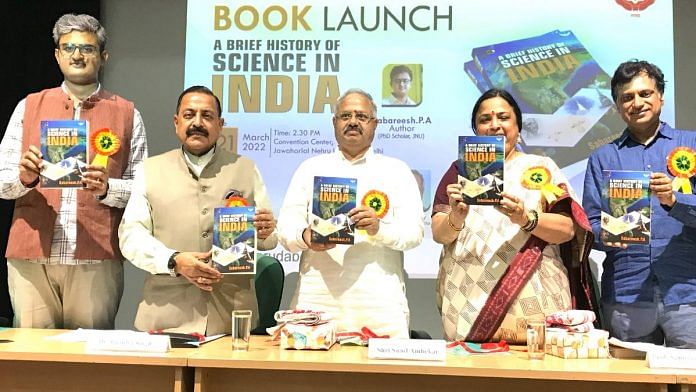New Delhi: Union Science Minister Jitendra Singh and RSS members were among the guests Monday at the launch of a book that seeks to trace the journey of science in India, “starting from the ancient pre-Vedic era until the modern times”.
The book, ‘A Brief History of Science in India’, has been authored by JNU PhD scholar Sabareesh P.A.
It seeks to note that ancient India had an edge over the world in scientific understanding and advancement.
The book talks about the concept of gravity being mentioned in the Vedas, and the assertion that surgery was performed in India as early as 1500 BC. Among other things, it says that “the first scripture on medicine and surgical proficiency was Sushruta Samhita [written] in about 600 BC which was adopted by modern conventional medicine”.
Ancient India’s contribution to cosmetic surgery finds mention in pieces of medical literature and news reports from around the world.
The book carries endorsements by BJP MP Vinay Sahasrabuddhe, Nalanda University Chancellor Vijay P. Bhatkar, UGC Chairperson M. Jagadesh Kumar, and David Frawley, Founder and Director of the American Institute of Vedic Studies, among others.
The launch was held at the Jawaharlal Nehru University (JNU) Convention Centre. It was attended by an auditorium full of students, including members of the RSS student wing, the Akhil Bharatiya Vidyarthi Parishad (ABVP).
Other guests included the head of the RSS’ media and publicity wing, Sunil Ambekar, and JNU Vice-Chancellor Santishree Dhulipudi Pandit.
Also Read: Meet the man who got Harsh Vardhan to believe Stephen Hawking endorsed the Vedas
What the book talks about
According to a chapter titled ‘Medicine’, in a part on ‘Reminiscences of Vedic Legacy’, the author writes, “There are literary evidences [sic] dating as far back as 1793, 1794 and 1816 which prove that surgery was practiced in ancient India as early as 1500 BC and the first scripture on medicine and surgical proficiency was Sushruta Samhita in about 600 BC which was adopted by modern conventional medicine.”
The author adds that a Maratha surgeon named Kumar performed a nose surgery on a Parsi bullock cart driver working with the British East India Company in 1792 — this, the author notes, was twenty years before a surgery using similar techniques was performed by a surgeon in England.
Joseph Constantine Carpue is believed to have performed the first plastic surgery in Britain on 22 October 1814, inspired by “reports of successful nasal reconstructions in India”.
The same chapter also says the Vedas had the mention of most modern-day diseases along with their cures, including seizures, fever, piles, leprosy, tuberculosis, and eye inflammation.
Talking about the concept of gravity, the author writes that it has its source in an ancient Indian text called Suryasiddhanta Shiromani Bhuvankosha dating to 528 AD.
He quotes a Sanskrit shloka from the text and translates its meaning to “Massive celestial bodies are attracted powerfully towards the Earth due to gravitational pull and they appear to fall as a result of such attraction. But when equal forces act on a body in space from all sides, how can it fall?”
He quotes shlokas from other texts to claim that “planetary motion” and “cause of an eclipse” were also concepts mentioned in the Vedas. He also says mathematical concepts such as the Pythagoras theorem, square and roots, and value of pi have origin in Indian ancient texts.
‘Colonial influence’ in Indian education
Addressing the event, minister Singh said Indians had always had a scientific understanding, irrespective of their education.
“What we need to understand and tell our next generations is that our potential is out of proportion to our resources, that is our history,” he added. “It is not directly linked to formal literacy… when the Soviet Union was sending its spacecraft to the Moon, we were in a primitive stage and, in the next few years, Neil Armstrong [became] the first American to land on the Moon.”
He said: “On a lighter note, I was telling some students the other day, Neil Armstrong simply walked on the Moon and could not see the presence of water, it was our Chandrayaan that captured the images of water… so, see the amazing potential we have,” he said.
The Indian education system, he added, has heavy “colonial influence” and “we must discuss the Indian wisdom and knowledge”. Singh then sought to congratulate the author and JNU V-C for the book and providing a platform for such a discussion to happen.
(Edited by Sunanda Ranjan)
Also Read: Modi govt looks to link Vedic texts with modern knowledge system, will fund research






